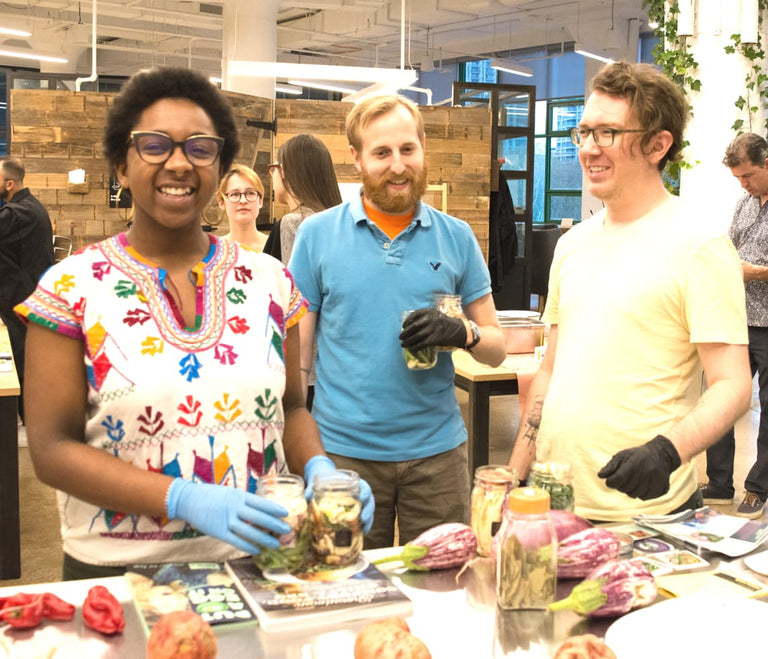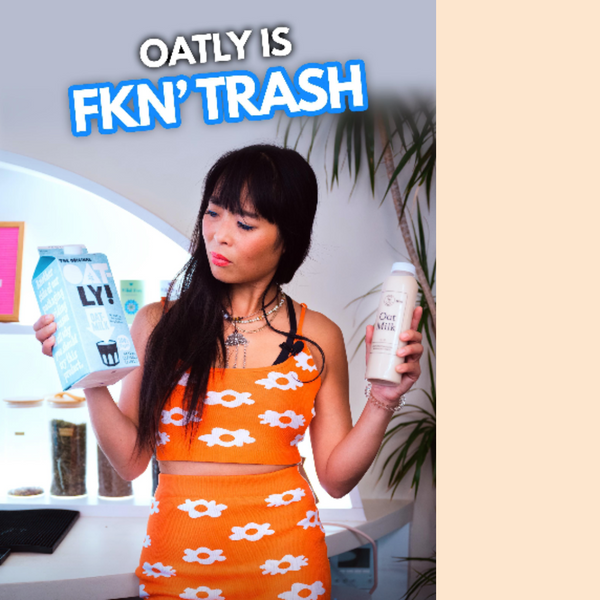Farm to Table Update: Geeking out on mushroom equipment
Local Roots interviewed our mushroom farmers, Matt Sicher and Jessie Tobin of Primordia Farm. We were so amazed at the taste and quality of their mushrooms we started an entire subscription around their fungi!
Recently, the couple got some new equipment for their family-owned business based in Lenhartsville, Pennsylvania. Matt and Jessie have been growing mushrooms together for as long as they’ve been dating, marking their personal and longstanding commitment to growing the mushrooms of the utmost quality, taste, and freshness. Now, along with their two children, Asa and Eli, Matt and Jessie have begun expanding their business to become both more sustainable and more profitable with the introduction of a new mixer, steam tanks, and solar panels.
(Matt and son inside mushroom barn)
Walk us through your work day today:
I start and end each day with a walk through the barns, checking stats on all grow rooms. The more consistent we can be for the mushrooms, the better. We confirm invoices, and outgoing goodies for customers, load up vans. Then harvest is early in the day, and while harvest is happening, I have the mixer going to prep for a substrate pack, or the laminar flow good going in the lab, to prep for inoculation. Then remainder of day is spent packing/steam sterilizing substrate, inoculating/doing lab work, and emptying old grow block/opening new ones, cleaning grow spaces, and packing customer orders. And interspersed through every day is creating and modifying equipment and the farm environment. Then invoices again at night! It usually starts at 8am then ends at 8:30 or 10:30pm.
What was the most rewarding part of your work day and why?
Most rewarding part is when all of the hard work actually works! When it all comes together to be able to enjoy high quality, interesting, efficiently produced, and profitable foods, created in buildings we built.
Can you give me a basic rundown of the growing process for you guys, specifically with growing inside the barn?
Basically, all of the gourmet varieties (which is the only thing we grow, we don't grow any other varieties) we grow from a substrate—like the soil part—and that is comprised of either a base of either saw dust, cottonseed hulls, or other amendments depending on the needs of whichever mushroom it is.
So then after that’s fixed up with whatever amendments, and the amendments are just things like the alkalinity of it or to add proteins, so sometimes there’s like soybeans in, sometimes there’s wheat bran in it. So depending on the needs of the particular mushroom, we do that whole song and dance, mix it up, and pack that into our biodegradable plastic bags and those plastic bagels are special because they have a little catch on them that allows for oxygen and carbon dioxide to come through but does not allow the amendments to get into the bag.
(Refurbished substrate mixer)
Those things are all packed up and after they're packed up, we put them into a large tank and we have that thing hooked up to a steam boiler and we steam cook those bags and up until now we’ve been cooking at an atmospheric pressure, meaning there's no pressure in the tank, which means we can only reach a maximum of 212 degrees in temperature.
(Substrate ready to load into steam sterilizer)
Those are some huge changes. In the new building, we also built a much bigger lab where we'll be able to do much more. We’ll be able to get our two autoclaves up and running, which will mean that we can be producing the majority of our bond which is like, for your purposes, you want to think of them as like the mushroom seeds. It's what we're putting into the bag after they've sterilized in the laboratory and that mycelium that’s in the fonds grows through that substrate then and once it’s kind of grown through the whole bag, we put them into the grow room.
So then after we after we sterilize we go into laboratory, that needs to happen within a couple of days of sterilization, and all of those bags go up into our fond room where they are just kept at a steady 70 degrees. They just hang out for usually about three weeks is the average, but there are a couple varieties that do more like four, there’s one that’s more like two weeks, but the average is about three weeks.
And what are the barns typically made with?
The barn that we just built is just a standard pole barn with metal sheeting and all that and that is now going to be the main kind of gust of the business because that’s where we’re producing all of the substrate from and where the laboratory is. The older barn, the oldest two barns were also pole bar structure, but they had wood siding, all insulated because we had to keep things at a steady temperature. Whether it's winter or summer, we really try to minimize how much that energy expenditure is going to be.
The smallest barns that we had used to be our laboratory and pack area, and now we'll be able to be turning that into specialty room specifically for breeding varieties like white trumpet and beech, things that are just a little bit more specific than what we've been able to have in our other barn. So we should be playing around with some new varieties and just kind of perfecting ones we’ve had for a long time like trumpets.
And we do have one barn that is a heavily insulated greenhouse frame that we found on an amazing website. So hopefully this year we’re actually putting some harder plastic on the outside of it because Matthew gets nervous every winter with what’s on there.
Now, for the new equipment that you guys got, how did you how did you come across and acquire that?
Oh, there was an advertisement in the back a mushroom grower's magazine. I'm not sure exactly where Matt found that. I think he was asking around to other growers in Kennett Square and one of the guys said, “Oh, well I saw an advertisement for a tank in the back of the magazine. Here you go,” and Matt ended up calling the number and it was this old man who is a Korean immigrant and had a pretty significant mushroom farm for a while in super rural Wisconsin. I guess the place where he was growing which was an old high school flooded not too long ago and kind of destroyed most of his business and it wound up going under unfortunately. But he was trying to get rid of all his specialty equipment.
How did you feel when you finally purchased this equipment? It is such a big investment and would change your operations a lot!
I have been anticipating and planning for this expansion for years! So, relief, excitement at possibilities, trepidation about the inevitable unforeseen challenges. Overall, a real feeling of hopefulness that this new setup will quickly change the quality of work life, and profitability of the business.
So you guys you guys are working on solar panels now, right?
Yeah, we actually just got approved for the loan. So we actually just found out that because we had purchased solar panels with a contract for the project, we’ll be able to even get tax credit because of the tax laws because as of 2020 the tax credit goes down. So I'm working on that stuff today actually but we were able to secure the loan for the portion of it that is for the business. And then we are applying for a USDA grant and I believe there is also a state grant that we are applying for to try and get some of that covered. I think the USDA grant is only 25% of the total cost of the project. We’re going to be able to get every roof covered with panels and it really should meet all of our kilowatt hour usage, and we're able to do that all on panels that we got used from a nonprofit called Power Up Gambia, where they take older installations like five or ten year old installations off of big corporate structures. These panels we have are from a Johnson and Johnson building. They took the full solar installation off, sent most of the panels to Gambia, but then they sell a portion of them to basically pay for shipping them to Gambia. We got the panels for a quarter of the price of new.
So you can run you can run the whole farm on solar, or how much of the farm can you run?
We should be able to run the whole farm on solar. I mean there are things that run on propane; the steam tank will not be able to run on solar and it probably wouldn't be a very efficient way to run the tank, so that will still be propane. And there’s a boiler or two which runs on propane and the steam tank that runs on propane. But huge amounts of energy are going to be shifting over to solar. Like our average electric bill is about $1,000 a month. It’s like a whole other mortgage in electricity.
Well, this sounds like a lot of change!
Yeah, and you know this change makes me feel really good about the impact that our production is having on the environment. It’s also at the same time stuff that should be actually making the farm more profitable for us very short term. So we’re doing double duty.

What are your other goals on the farm for 2020?
Big stuff...we have successfully transitioned to all bio-degradable grow bags! This is a big deal.
What’s the next equipment you want to invest in and why?
Next equipment, a small front end loader, to replace our little ancient front end loader circa 1973! I keep it going, but we sure do need another! I’m the only one who operates it, because it has no brakes, among other, um, unique things about it. With a newer one, I wouldn’t be the only one on the farm to be able to safely operate the thing. Aaaand then I can travel around on more adventures, collecting more fungal cultures to play with. Just sayin.
Plus, more lab equipment (pneumatic auto-inoculation machine, and spawn mixer.. both of which I have started working on, but gotta finish!), to allow that critical phase of the farm to operate as bullet proof as possible.
Try Matt and Jesse's super delicious, powered by solar energy mushroom with our 2 week starter kit! Be sure to follow us on Instagram to find out about upcoming trips to visit Primordia Farm!
Written by Local Roots volunteer Jess Santoro
Rather have a taste first?
Local Roots Experiences are fun, pop-up events where we bring the farm to you!

Become a Harvest Club Pick Up Location
Are you a NY based cafe, bar, or neighborhood business? Become a Harvest Club pick up location and have community members come to your establishment each week to pick up their Local Roots harvest.
Top








